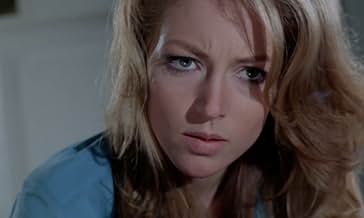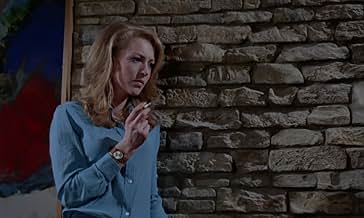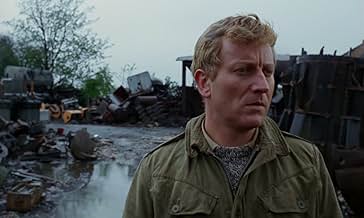PUNTUACIÓN EN IMDb
6,9/10
2,1 mil
TU PUNTUACIÓN
Un grupo de delincuentes británicos planea el asalto al tren Royal Mail en la ruta Glasgow-Londres.Un grupo de delincuentes británicos planea el asalto al tren Royal Mail en la ruta Glasgow-Londres.Un grupo de delincuentes británicos planea el asalto al tren Royal Mail en la ruta Glasgow-Londres.
- Premios
- 1 premio en total
Patrick Jordan
- Freddy
- (as Patrick Jordon)
Kenneth Farrington
- Seventh Robber
- (as Ken Farrington)
Roger Booth
- Detective
- (sin acreditar)
Ron Charles
- Seaman
- (sin acreditar)
Argumento
¿Sabías que...?
- CuriosidadesIt was the realistic car chase through the streets of London in this picture, that led to director Peter Yates doing another car chase in San Francisco a year later. Steve McQueen personally wanted Yates for what turned out to be his highest grossing film Bullitt (1968).
- PifiasWhen the traffic warden puts the gas canister in the car, a white cable can be seen draping from the inside of the door and this is seen to be connected to the device as he removes it from his bag. There is no sign of the cable in the following close-up shot from his point of view.
- Citas
Paul Clifton: We're talking about millions of pounds now. We're talking about road blocks, car searches, house raids, shakedowns. They'll know who pulled the job. Without the money, they can't prove anything.
- ConexionesFeatured in Film Review: Film Review (1967)
Reseña destacada
Robbery is for me a semi-documentary / thriller based on the Great Train Robbery of 1963. The location of the actual heist, on a bridge crossing a country lane bears similarity to the real robbery. The film moves around much of 60s London in the first part, during which time the gang are robbing to gain funds, plus planning the main robbery.
The gangs' meeting on the terraces during a Leyton Orient match is well screened; Stanley Baker becomes so heated during their discussion he misses a great run and shot against the crossbar shown from the pitch!
As for the central characters, Stanley Baker superbly plays "Mr Big" Paul Clifton, who is a character that the viewer never quite gets to know the limits. For example he tells the gang "we don't need guns, the police don't carry them"; later his wife finds his revolver at home, when quizzed he says "the gun is because I not going back inside (prison)".
William Marlowe cleverly plays Clifton's "number 2" Dave Aitken, who is clearly "nice cop" versus Clifton's "bad cop" in terms of running the gang.
As with the real train robbery, the gang make a successful robbery; however mistakes made during hideway contribute to their eventual capture. Not least when their contact who "cleans up" the getaway vehicles is apprehended at an airport leaving the UK with about £50K stuffed up his coat - his capture enables the police to set up a successful trap for the rest of the gang.
The ending of the film is probably a slight movement forward from many 1950s movies where the gang are all caught - the ending to Robbery slightly leaves the viewer guessing. This is a film for enthusiasts of films of past years, who may like to spot London landmarks.
The gangs' meeting on the terraces during a Leyton Orient match is well screened; Stanley Baker becomes so heated during their discussion he misses a great run and shot against the crossbar shown from the pitch!
As for the central characters, Stanley Baker superbly plays "Mr Big" Paul Clifton, who is a character that the viewer never quite gets to know the limits. For example he tells the gang "we don't need guns, the police don't carry them"; later his wife finds his revolver at home, when quizzed he says "the gun is because I not going back inside (prison)".
William Marlowe cleverly plays Clifton's "number 2" Dave Aitken, who is clearly "nice cop" versus Clifton's "bad cop" in terms of running the gang.
As with the real train robbery, the gang make a successful robbery; however mistakes made during hideway contribute to their eventual capture. Not least when their contact who "cleans up" the getaway vehicles is apprehended at an airport leaving the UK with about £50K stuffed up his coat - his capture enables the police to set up a successful trap for the rest of the gang.
The ending of the film is probably a slight movement forward from many 1950s movies where the gang are all caught - the ending to Robbery slightly leaves the viewer guessing. This is a film for enthusiasts of films of past years, who may like to spot London landmarks.
- richard-payne-2
- 14 sept 2004
- Enlace permanente
Selecciones populares
Inicia sesión para calificar y añadir a tu lista para recibir recomendaciones personalizadas
- How long is Robbery?Con tecnología de Alexa
Detalles
- Fecha de lanzamiento
- País de origen
- Idioma
- Títulos en diferentes países
- Robbery
- Localizaciones del rodaje
- Leyton Stadium, Brisbane Road, Leyton, Londres, Inglaterra, Reino Unido(Paul Clifton plans the train robbery with Frank, Dave, Ben and Don during a football match)
- Empresas productoras
- Ver más compañías en los créditos en IMDbPro
Contribuir a esta página
Sugerir un cambio o añadir el contenido que falta

Principal laguna de datos
By what name was El gran robo (1967) officially released in India in English?
Responde


































